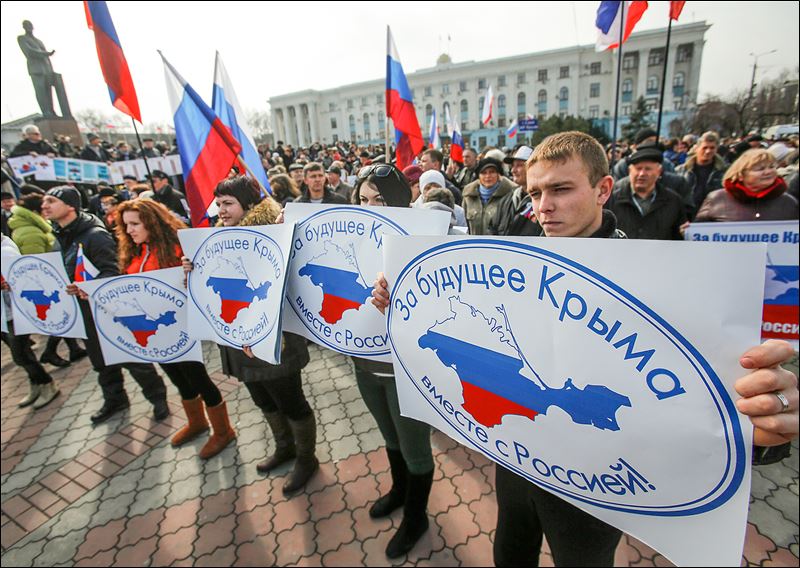
America reacts to the Ukraine crisis with a give-and-take. Secretary of State John Kerry landed in Kiev on Tuesday, taking with him a promise to support the Ukrainian government with $1 billion in loan guarantees. Admittedly, Congress must still approve them. Hence, it remains unclear to what extent the aid is conditional, as it represents the International Monetary Fund’s (IMF) adjustment programs.
But currently, President Barack Obama’s administration is less about fiscal sustainability than it is about a political instant message: The legitimacy of the challenge to Putin’s transitional government should not be rattled by financial constraints.
Washington Prepares Sanctions
The giving is not as easy as was thought, because the IMF has vivid memories of how callously the Western-oriented government of former Prime Minister Yulia Tymoshenko ignored its obligations. However, the taking appears even more complicated. On Monday, Obama affirmed that his administration is considering “a whole series” of economic and diplomatic steps, “that will isolate Russia and will have a negative impact on Russia’s economy and its [standing] in the world.” The spokesperson for the secretary of state seconded him by saying that America “[is] not just considering sanctions … It is likely we will put those in place … We are preparing options and we are likely moving down that path.” But the details were not disclosed. Rather, they are referred to in Washington as the “broad range of options.”
Kerry’s spokesperson insinuated that the Americans will hardly rush ahead with wide economic sanctions while the main consumers of Russia’s natural gas and Russia’s investors in the EU balk at them. “We are looking at the best way to hold people accountable,” Kerry’s spokesperson said. Thus, the initial decision will be to target sanctions, such as blocking accounts and imposing travel bans against those involved in the occupation of Crimea. It remained unclear whether the Americans would aim up high in the Kremlin when executing the chain of command.
Retreat from Crimea as a Condition
In contrast, not only are there appeals from Europe to leave the communication channels to President Vladimir Putin open, Obama introduced a caveat to the threat of sanctions: He only wants to punish them if the Russians “continue on the current trajectory that they’re on.”* Even so, the State Department assures that Moscow could not avoid sanctions this way — if it wavers entirely on intervention in other parts of Ukraine. The withdrawal of troops from Crimea remains America’s condition.
The measures that Washington has already taken are symbolic. America initially suspended participation in all G-8 meetings, and thus in the preparation of the summit that Putin wanted to achieve in Sochi in June. Within 24 hours, Washington convinced all of the G-7 partners to join [the U.S.] in the boycott; Berlin hesitated the longest in making the declaration. Russia’s exclusion from the G-8 is so far only a vague threat. Without consultation with the Europeans, Washington was also able to suspend talks on a bilateral trade agreement. These were added recently — because Obama sought a mutual project with Putin which could justify future meetings and endow trust.
America Takes No Military Steps
On Monday, the White House announced that Obama would not send a presidential delegation to the opening of the Paralympic Games on Friday in Sochi, but that American athletes could rely on the support of the commander-in-chief. Finally, the Pentagon announced that it would expose the so-called military cooperation with Moscow. The message resonated with regret: Although the Department of Defense recognizes the “value” of development in recent years, contacts between military leaders “to increase transparency, build understanding and reduce the risk of military miscalculation” should be put on hold. Likewise, the Pentagon assured the armed forces that absolutely no troops or ships would be redeployed to respond to the Crimea crisis.
Options for military action are not being considered, even by those Republicans who blame Obama for having encouraged Putin to take America less seriously with his cuts to the defense budget and his empty threats. It remains unclear whether Obama agrees with one of his critics, Sen. John McCain, in other matters. McCain scolded that he was “very disappointed” in Chancellor Angela Merkel’s attitude. As in the Libyan intervention (from which Berlin abstained in the U.N. Security Council), the Germans pull themselves “off of everything.” Putin, predicts McCain, knows Merkel and thus fully believes he will get away with his actions.
*Editor’s note: The original quotation, accurately translated, could not be verified.

Leave a Reply
You must be logged in to post a comment.